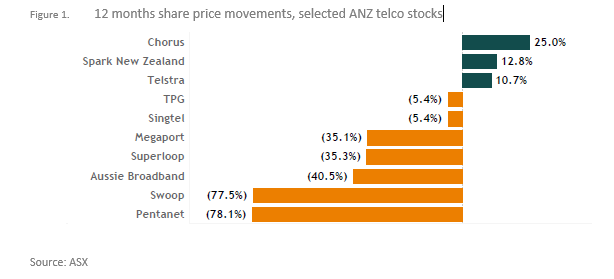BRIEF: SAU process still a big opportunity for telcos and end-users
- Publisher : Venture Insights
- Publish Date : May 3, 2023

SAU process still a big opportunity for telcos and end-users
TLDR version: The ACCC’s concerns with the last draft of NBN Co’s SAU are about driving efficiency and ensuring more certainty and less risk for RSPs, freeing them to drive usage. Getting this right will have significant benefits for the industry and for end-users. New Zealand provides the benchmark for regulatory outcomes in fixed broadband.
ACCC highlights need for efficiency, certainty
We have previously highlighted the price deflation that has eroded telco industry returns over the last decade. Inflation is a dirty word right now, but the telco industry needs to reverse the long-term trend of price deflation if it is to attract the investment needed to address rising demand for data capacity.
The ACCC’s rejection of the latest NBN SAU is disappointing only because it means delay. The Commission’s reasons for the rejection however are impeccable. In summary, the ACCC wants further work on the SAU to address two key issues: better incentives for NBN Co to pursue efficiencies, and more certainty for the NBN’s Retail Service Provider (RSP) customers about future wholesale price evolution.
The latter is important because the ACCC acknowledges the industry’s need to institute higher prices for fixed broadband. In a speech to the CommsDay Summit on 2 May 2023, ACCC Commissioner Brakey said that “as matters stand, NBN Co’s revenues are materially below efficient cost levels and that growth in demand alone could not reasonably be anticipated to balance this shortfall”. That can only mean one thing: higher average wholesale pricing. This comes as no shock to the industry or any close observer.
In addition, the industry has sought greater consistency in pricing; NBN Co’s practice of using temporary discounting to drive upsell of higher-ARPU products in retail markets cuts across the RSPs’ own marketing efforts. In theory, RSPs were supposed to own the relationship with the end-user. But we are reminded of Deakin’s remark about the supposed independence of the Australian States: “[The Constitution] left them legally free, but financially bound to the chariot wheels of the central government”.
The uncertainty centres on the capacity volume charge (CVC), which is where the discounting generally happens. More fundamentally, the very existence of a capacity charge shifts the risks of rising data usage away from NBN Co and onto the RSPs, because rising usage drives up RSP costs. And this has reduced the RSPs’ incentives to drive usage.
The ACCC has accepted the NBN Co’s proposal for a staged removal of the CVC. This will shift the risks of rising usage away from the RSPs and back onto the NBN Co, which is plainly best placed to manage that risk. That process began when the NBN Co announced it would not seek to recover all of its sunk costs in the network rollout, taking a haircut that will ultimately benefit the rest of the industry and the national economy.
Why does this matter?
Essentially, the trajectory of Australian fixed broadband regulation is towards a place that New Zealand reached years ago. The contrast with New Zealand is instructive. The absence of a capacity charge has generated a completely different internal politics within the industry, with less conflict and tension over pricing, and more focus on driving usage. And this has benefitted end-users.
Add in straightforward price and revenue regulation based on CPI movements, designed to ensure return on capital invested, and the result is higher confidence amongst both wholesale and retail providers in New Zealand.
This confidence is evident in the starkly divergent share price performances in Australia and New Zealand that are documented in our latest Telco Valuation Comps Dashboard. (We are not claiming this explains all of the difference, just that it helps).

New Zealand is moving towards stronger ability to finance future investment. Whatever the delays and compromises of the SAU process, it will ultimately put the Australian industry on firmer footing to do the same.
About Venture Insights
Venture Insights is an independent company providing research services to companies across the media, telco and tech sectors in Australia, New Zealand, and Europe.
For more information go to www.ventureinsights.com.au or contact us at contact@ventureinsights.com.au
